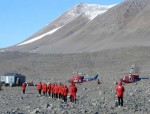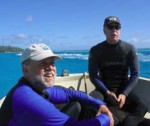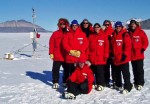The past year, like all odd years, was marked by mid-term site reviews: with 11 visits, this was the largest of the three Long Term Ecological Research (LTER) award cohorts. In contrast, we had six site visits in 2005 and we will have nine in '09. The geographic coverage was also the largest: from the Arctic tundra (ARC) in northern Alaska, to the first review of the Moorea Coral Reef (MCR) in French Polynesia, to the McMurdo Dry Valleys (MCM) in Antarctica, and up the east coast to Plum Island (PIE) in northern Massachusetts and Hubbard Brook (HBR) in northern New Hampshire. And finally, the "biome" coverage was also extensive, including marine, desert, urban, forest, tundra, and coastal sites. In the process, both Henry Gholz and Bob Waide became likely the first people to have visited all 26 LTER sites.
The collective assessments from the review teams certified LTER science, education, information management (IM), outreach, and project management as very healthy. They also revealed the great extent to which the Integrative Science for Society and Environment (ISSE) and Decadal Plan for LTER are already influencing the conceptual evolution of the current LTER. Most sites are becoming vested in network-level activities across the review areas, with impressive developments in IM that will be critical in enabling these new activities.
Another keystone event of the year was April's LTER renewal proposal panel for the six sites reviewed in '05. As a result four sites are being recommended for renewal as proposed, one site must file an addendum, and one was placed on a two-year probation with a second renewal proposal to be submitted for the next panel in April 2010.
A landmark for 2008-and for the history of the LTER program-was, of course, the submission of the Decadal Plan in the context of previous submissions and the ISSE's call for a new overarching funding initiative. Both documents have found a receptive and expanding audience across the Foundation. As the general level of interest and discussion concerning environmental science increases across NSF (and across all other Federal Government agencies), it is likely that the more concise and conceptual ISSE document will figure prominently in discussions over the next couple of years. As evidenced by the site review reports, LTER is not standing still, but has taken its strategic plan to heart and is moving down the road of more integrative and networked programming.
In terms of NSF funding for LTER, we were able to support both the core projects as well as provide over $3.2 million in supplementary funding from the LTER program office in the Directorate of Biological Sciences, Division of Environmental Biology (BIO/DEB) and the various other programs that support LTER across the Foundation. The large supplement total was due in part to greater support for social science proposals than in the past from the Social, Behavioral and Economic Science Directorate (SBE). With additional support from the cross-directorate Environmental Research and Education (ERE) Working Group, 15 out of 22 social science requests were supported this year. But the bulk of the funding reflects the commitments from SBE, the Directorate of Geosciences (GEO)/Bio-Oceanography, and the Office of International Science and Engineering (OISE), in joining BIO/LTER to provide advanced funding for the 2009 LTER All-Scientists Meeting. The LTER Network Office can now move ahead to secure meeting facilities at Estes Park, CO, and to plan this important meeting effectively and efficiently. OISE also provided support for nine out of18 request for international supplemental support.
Finally, the rotational movement of program directors at NSF continues apace. We enjoyed having Dan Childers working in the Ecosystem Science Cluster on LTER this past year. But Dan, Jim Raich, and Martyn Caldwell have all now moved on from the Cluster to Arizona State University , Iowa State University and the golden years of retirement (Martyn on June 30), respectively. Todd Crowl from Luquillo LTER followed in Martyn's footsteps from Utah State, and took over June 9 from Dan to work with Henry on LTER and Ecosystems. And Ann Russell has just moved over from Ecology to the Ecosystems Program. So, look for communications over the coming couple of years from Henry and Todd.

 Enlarge this image
Enlarge this image

